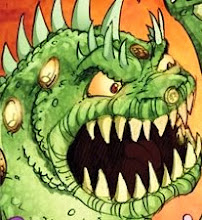Or rather, kid books.
About, oh, six weeks ago, I bought this:
It's a book about the periodic table of the elements. It's from the Basher Scicence Series of books, and aimed for, oh, eight year olds? Thereabouts.
It was intended for me. I'm still working at teaching myself chemistry, and thought maybe a children's book would lay out the periodic table in a way that, finally, made sense to me.
No luck.
I think I'm going to start treating the periodic table as a sort of map - a picture of stuff, so to speak, rather than an actual chart put into sensible grids. It's the damned electron shells. I keep trying to UNDERSTAND them, and really, I've learned from algebra, I need to give up on understanding and just memorize the damn stuff.
Right.
But then a fun thing happened. The Goober got hold of the book. And since it had illustrations and cartoons in it, she decided it was HER book, and insisted I read it to her. For a couple weeks, every night we would take a group/column from the periodic table and read about them. I have no idea how much of it she really understood, but I feel we're probably one step closer to a particle accelerator in the basement.
With all this in mind, I got a couple other Basher science books and let the kid pick which one she wanted to read, first.
We've run through the planets, the space probes and rovers, the Oort Cloud and the Kupier Belt. Now we're on to stars - types and formations and constellations. She's loving every minute of it. With all the books in the series, we're probably set on bedtime reading material until Christmas.
I feel like I'm dealing with a miniature version of my own brain. Which is both very cool, and kind of intimidating.
Friday, May 04, 2012
Subscribe to:
Post Comments (Atom)

.jpg)












7 comments:
Have you read The Disappearing Spoon, by Sam Kean? It's all about how the periodic table was developed and why it's laid out the way it is. You'll probably still have to just memorize it, but the background info and cool element facts might help make it stick better.
Julie, thanks so much for the heads up on these books -- I had just ordered the NG Kids books on weather and rocks/minerals but these look like they'd be an awesome addition to our library.
And good luck with the periodic table! (I'm now having flashbacks to grade 11 chem -- shudder.)
have you heard of the khan academy? http://www.khanacademy.org/science/chemistry
that man is amazing. check out his videos, he has at least one about the periodic table.
i'm a visual person, so what helped me the most to understand atoms and the different element groups was drawing out the different orbital shells.
It may be that the "explanations" of the periodic table are just not written at your * instinctive * level of understanding, and that's not a put-down - it may be that deep down you understand it at a higher, more accurate level than your textbooks are currently giving you. It may make more sense later. So memorize for now to get the grade, and hope for better.
Julie, start running now. We had two kids like the Goober and had to learn at full speed just to stay half a step ahead through high school. Once they hit college I was lost and Durwood stopped trying and just beamed at them. Smart kids are a challenge but tons of fun.
I think atoms are pretty. That's as much as I understand.
I'm a science teacher and I've just been teaching (or trying to!) teach my students all about this :D
Short answer is that only so electrons can fit into a given shell. As you move out, more can fit. So the inner has 2, the next one 8, the next one... well it does get a bit more complicated after that- assume 8 but with an asterisk since it CAN have 18 but only if some are already in the previous... Um, basically assume 8 until you get to the transition metals (that big block in the middle of the periodic table).
http://www.ptable.com/ is a nice website if you want the slightly more complicated shell model, or
http://excelhero.com/periodic-table/ is nice for the simple model (just click the element from the periodic table and you can see the shells).
Or failing that, google 'video periodic table' where you can find some cool info about the elements, often featuring the most stereotypical mad scientist appearing bloke I've ever seen!
I did the same thing with famous artists. I love kids books... they're organized, they present the information in an interesting way, and they really do help adults learn!
Post a Comment